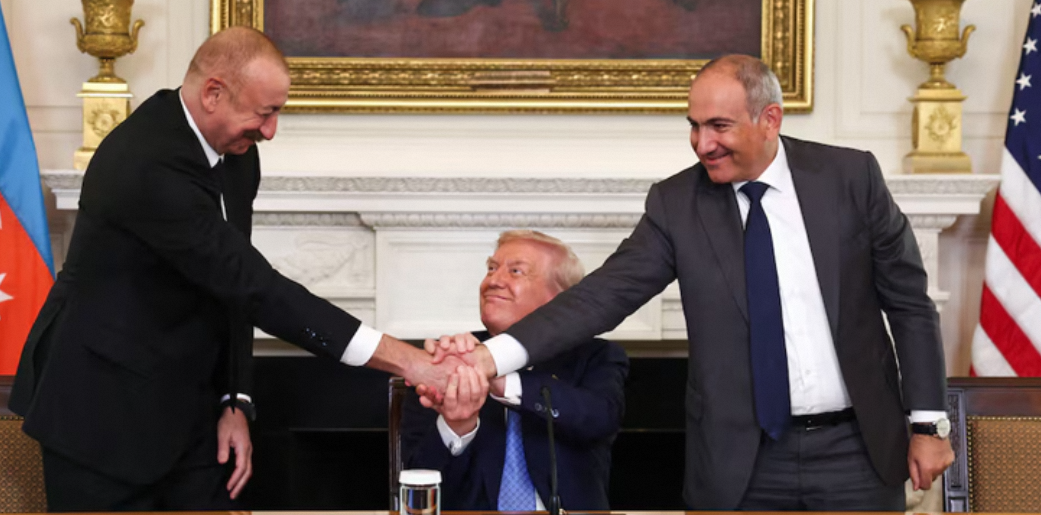Turning the Page on Decades of Conflict
On Friday, Azerbaijan and Armenia stunned the world by signing a U.S.-brokered peace agreement at the White House, ushering in a new chapter after more than three decades of hostility. U.S. President Donald Trump presided over the signing ceremony, flanked by Azerbaijani President Ilham Aliyev and Armenian Prime Minister Nikol Pashinyan. The agreement marks a remarkable diplomatic achievement for the United States, particularly as it shifts the delicate geopolitical balance in the South Caucasus, a region long considered within Russia’s sphere of influence.
President Trump hailed the moment, stating, “It’s a long time – 35 years – they fought and now they’re friends, and they’re going to be friends for a long time.”
A Conflict Rooted in Nagorno-Karabakh
The enmity between Armenia and Azerbaijan traces back to the late 1980s when Nagorno-Karabakh, a mountainous region within Azerbaijan, broke away with Armenia’s backing. The recent retaking of the territory by Azerbaijan in 2023 caused nearly all of Nagorno-Karabakh’s 100,000 ethnic Armenians to flee to Armenia, further deepening hostilities. The new agreement commits both countries to cease hostilities, respect each other’s territorial integrity, and initiate the process of normalizing diplomatic relations.
Boosting Economic Ties and Strategic Interests
A central element of the peace deal grants the United States exclusive development rights over a strategic transit corridor in the South Caucasus. According to the White House, this corridor is expected to boost exports of energy and other resources, solidifying the region’s importance as an energy hub and opening new avenues for economic cooperation.
Trump also announced new bilateral agreements with both Azerbaijan and Armenia aimed at expanding collaboration in energy, trade, and technology sectors, including artificial intelligence. Although specific details have not been disclosed, the lifting of restrictions on defense cooperation between Azerbaijan and the United States signals a notable shift, one that is likely to unsettle Moscow.
International and Regional Implications
The agreement carries implications far beyond the immediate region. The South Caucasus, bordered by Russia, Europe, Turkey, and Iran, is a critical energy-producing area with numerous oil and gas pipelines but has long suffered from closed borders and ethnic strife. The peace deal, if it endures, could transform these dynamics, facilitating greater regional integration and economic development.
According to Brett Erickson, an expert in sanctions policy, the deal also enhances the West’s ability to counter Russian sanctions evasion, as the Caucasus has historically been a blind spot in enforcement efforts. “A formal peace creates a platform for the West to engage Armenia and Azerbaijan … to shut down the evasion pipelines,” he noted.
Symbolism and Lingering Questions
Despite the undeniable symbolism of the White House ceremony, analysts caution that numerous challenges remain. Tina Dolbaia of the Center for Strategic and International Studies highlighted uncertainties regarding which companies will control the transit corridor and the extent of Armenian and Azerbaijani involvement in its construction. She also noted the likelihood of Russian irritation at being sidelined in both the peace process and the development of the corridor.
Olesya Vartanyan, a regional expert, echoed these concerns, emphasizing that the durability of peace will depend heavily on sustained U.S. engagement. She pointed out that the history between Armenia and Azerbaijan is replete with failed negotiations and violent escalations.
A Signal to the Region
Senior U.S. administration officials view the agreement as a groundbreaking end to one of several so-called “frozen conflicts” lingering on Russia’s periphery since the Cold War. The move is seen as sending a powerful message to the wider region about the potential for resolving entrenched disputes and opening new pathways for cooperation.
Human Rights Concerns and Future Prospects
While the agreement paves the way for economic growth and regional stability, human rights organizations have called on the U.S. to use its influence to address political repression, particularly in Azerbaijan, where hundreds of political prisoners remain detained. Despite these calls, Azerbaijani authorities have rejected Western criticism as unwarranted interference.
Topics #Azerbaijan Armenia peace agreement #Nagorno-Karabakh conflict #South Caucasus transit corridor #trending pakistan #U.S. diplomatic achievements




